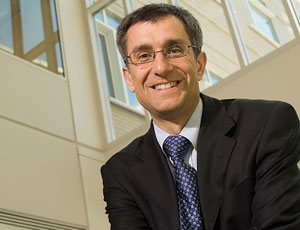...engineering school of New York University and Polytechnic University in New York City, the number of grad students is up 30%, says Larry Chiarelli, its interim dean. He says there are more students who are “paying out of pocket to get better positions,” instead of relying on employer tuition reimbursements.

Waiting Out the Storm
Ed Jaselskis of Iowa State says the school has a growing number of students who are returning to school after losing jobs, and many are enrolling in the rapidly growing distance-learning program. Students want to make sure they are marketable and are looking to stretch out their education by adding minors. “There seems to be more interest now in staying in school a little longer and waiting out this storm and, hopefully, [becoming] even more marketable,” Jaselskis says.
Firms also are taking a wait-and-see attitude, hiring more interns to tide them over until the spring, when they hope the industry will begin to recover. “Hopefully, they will start hiring with great gusto,” Jaselskis says.
At Louisiana State University, Baton Rouge, the number of students in its construction-management program dropped to 573 in the current school year, from 684 in 2008-2009. But Emerald Roider, an associate professor in the department, says more students are seeking advanced degrees, and the department has developed a mentoring program with its industry advisory council that pairs interested students with an industry volunteer for one semester.
The construction-management program at Northern Michigan University, Marquette, has seen a slight dip in enrollment of 8% to 10% because of the recession, but at 186 students, it has doubled since 2001, says Michael Andary, who co-runs the program. “Our dip was smaller than the dip in most people’s 401(k),” he says.
The economy is prompting many students to stay at community colleges for the first two years before enrolling at NMU, Andary says. He says he also currently is working with candidates hoping to enter the program in January after losing jobs.
Even with a 10% falloff in company job-fair attendance, graduates still are finding work if they expand their options and polish their résumés enough, says Andary. “The separation between you and your pack has to come from your extracurricular activities,” he advises students. He is optimistic about the future employment market but remains a little wary. “I don’t know what will happen if this continues for another two years,” he says.
Making a Difference
Joseph J. Helble, dean of the Thayer School of Engineering at Dartmouth University, Hanover, N.H., says he was surprised by strong hiring trends at the school this year—on par with the last two. He says significantly more of Dartmouth’s engineering and engineering-management grads chose construction jobs over those in finance or business consulting.
Dartmouth’s future classes show signs of strong growth. “Our junior class is 30% larger than it has been for a decade,” Helble says, adding that undergraduate classes could exceed that. “Students are seeing the direct relevance of engineering addressing the issues—the ‘grand challenges’...that society faces,” he says. While the school saw a 23% drop in its endowment, he says rising enrollment and increased research funding made up the difference.
With its hiring slowed, Wentworth Institute is encouraging students “to think bigger and broader,” says CM-program coordinator Mark Hasso. But school officials are doing likewise by creating joint curricula for first-year construction...




Post a comment to this article
Report Abusive Comment